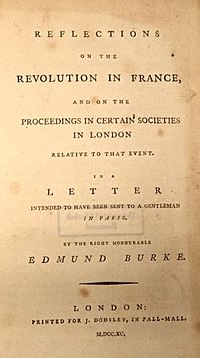
Back الجدل حول الثورة Arabic Revolucia debato Esperanto Controverse révolutionnaire French Revolusjonsdebatten NB Controvérsia da Revolução Portuguese
This article relies largely or entirely on a single source. (December 2021) |
The Revolution Controversy was a British debate over the French Revolution from 1789 to 1795.[1] A pamphlet war began in earnest after the publication of Edmund Burke's Reflections on the Revolution in France (1790), which defended the House of Bourbon, the French aristocracy, and the Catholic Church in France. Because he had supported the American Patriots in their rebellion against Great Britain, Burke's views sent a shockwave through the British Isles. Many writers responded to defend the French Revolution, such as Thomas Paine, Mary Wollstonecraft and William Godwin.[1] Alfred Cobban calls the debate that erupted "perhaps the last real discussion of the fundamentals of politics" in Britain.[2] The themes articulated by those responding to Burke would become a central feature of the radical working-class movement in Britain in the 19th century and of Romanticism.[3] Most Britons celebrated the storming of the Bastille in 1789 and believed that The Kingdom of France should be curtailed by a more democratic form of government. However, by December 1795, after the Reign of Terror and the War of the First Coalition, few still supported the French cause.[citation needed]
© MMXXIII Rich X Search. We shall prevail. All rights reserved. Rich X Search

